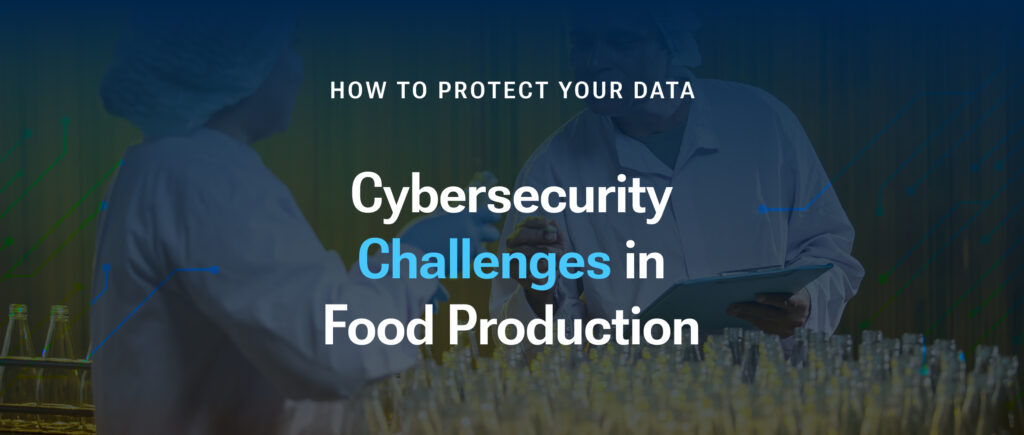The food production industry, like many others, increasingly relies on technology to streamline operations, track inventory, and manage supply chains. However, with this shift comes heightened exposure to cybersecurity challenges. As cyber threats become more sophisticated, food production companies, particularly in Oklahoma City and nearby areas like Bethany, Edmond, and Midwest City, must prioritize data protection to avoid costly breaches, downtime, and reputational damage.
In this post, we’ll explore the cybersecurity challenges that food production companies face and offer practical solutions to protect sensitive data, maintain operational efficiency, and stay compliant with industry regulations.
The Growing Cybersecurity Challenges in Food Production
Cybercriminals are increasingly targeting food production companies for various reasons, from stealing valuable proprietary information to disrupting operations through ransomware attacks. With the food industry’s complex supply chains and reliance on automated systems and Internet of Things (IoT) devices, companies in Oklahoma City and surrounding areas are at a higher risk of falling victim to cyberattacks.
1. Ransomware Attacks
Ransomware is one of the most prevalent cyber threats, where hackers encrypt a company’s data and demand a ransom to release it. For food production companies, even a short system outage can lead to production delays and lost revenue, making them particularly vulnerable. A strong disaster recovery plan and secure backup systems are essential for companies in Edmond and Nichols Hills to avoid the downtime that ransomware attacks can cause.
2. Supply Chain Vulnerabilities
Food production companies in Midwest City and The Village work with numerous vendors, making supply chains a prime target for cybercriminals. A weak link in the supply chain can give hackers access to sensitive information, which may then be used to infiltrate systems or cause data breaches. Implementing stringent network security measures across the entire supply chain is essential to protecting proprietary data and ensuring that each partner meets cybersecurity standards.
3. Data Breaches and Insider Threats
Data breaches can result from external attacks or internal threats, such as employees inadvertently leaking sensitive information. Food companies often store valuable data like supplier information, recipes, and trade secrets. Implementing multi-factor authentication, regular employee training, and data access controls can significantly reduce the risk of breaches for companies in Warr Acres and Woodlawn Park.
Cybersecurity Best Practices for Food Production Companies
With the growing risk of cyberattacks, food production companies need to be proactive in their approach to cybersecurity. Here are some key cybersecurity best practices to help protect your data:
1. Implement Robust Network Security Solutions
Protecting your systems with advanced network security solutions is crucial. This includes firewalls, intrusion detection systems, and encrypted communication channels. For food companies in Oklahoma City, partnering with a managed IT service provider ensures constant monitoring of your network for suspicious activity, reducing the risk of breaches.
2. Regularly Update Software and Systems
Outdated software and systems are prime targets for hackers. Ensure that all your software, including IoT devices, is up to date with the latest security patches. Implementing a patch management policy helps food companies in Bethany and Edmond minimize vulnerabilities that hackers can exploit.
3. Data Backup and Disaster Recovery Solutions
Data loss can have devastating consequences in the food production industry. A solid backup data and disaster recovery plan ensures that in the event of a cyberattack, critical data can be restored quickly, minimizing downtime and financial loss for food companies in Oklahoma City.
4. Employee Training and Awareness
Human error is one of the most significant vulnerabilities in cybersecurity. Regularly training employees on cybersecurity best practices, phishing scams, and secure data handling is essential to reducing the risk of internal threats and accidental breaches in Midwest City and Nichols Hills.
5. Supply Chain Security
Supply chains can expose food production companies to significant cyber risks. Ensure that all suppliers and partners meet your cybersecurity standards and regularly audit their security practices to protect your systems from external vulnerabilities.
The Role of Managed IT Services in Cybersecurity for Food Production
Maintaining a comprehensive cybersecurity strategy requires expertise, time, and resources that many food production companies may lack. This is where managed IT services can play a vital role. Managed service providers (MSPs) offer 24/7 monitoring, regular system updates, and rapid incident response, helping companies in Oklahoma City and nearby areas stay secure while focusing on their core business activities.
Here’s how managed IT services can benefit food production companies:
1. Proactive Threat Detection
MSPs monitor your network for suspicious activity, ensuring that potential threats are identified and addressed before they become serious issues. This proactive approach is essential for companies in Edmond and The Village to stay ahead of cybercriminals.
2. Data Backup and Recovery
In the event of a cyberattack, managed IT providers can quickly restore your systems with secure backup solutions, minimizing downtime for food production companies in Bethany and Warr Acres.
3. Compliance Support
Food production companies must comply with industry regulations such as the FDA’s Food Safety Modernization Act (FSMA). Managed IT services help ensure that your systems meet regulatory requirements by implementing and maintaining security protocols, keeping companies in Oklahoma City compliant.
Conclusion: Stay Protected with Advanced Cybersecurity Strategies
The food production industry faces growing cybersecurity challenges as technology becomes more integrated into everyday operations. To protect your data and minimize the risk of costly cyberattacks, adopting a proactive cybersecurity strategy is essential. At Advance Network Design, we specialize in helping food companies in Oklahoma City and surrounding areas safeguard their operations with expert cybersecurity solutions.
Contact us today to learn more about how we can protect your food production company from cyber threats and ensure the security of your critical systems.
FAQs
1. What are the biggest cybersecurity challenges for food production companies?
The most significant cybersecurity threats in the food production industry include ransomware attacks, supply chain vulnerabilities, and data breaches.
2. How can managed IT services help improve cybersecurity for food production companies?
Managed IT services provide proactive monitoring, data backup, disaster recovery solutions, and compliance support, all of which help improve cybersecurity.
3. Why is network security important in food production?
Strong network security protects sensitive data from unauthorized access, ensuring that critical business operations run without disruption.
4. What steps can food production companies take to protect against ransomware?
Implementing data backup solutions, regularly updating systems, and educating employees about phishing scams can help protect against ransomware attacks.
5. How can food production companies secure their supply chains?
Ensuring that all suppliers and partners meet stringent cybersecurity standards is key to securing the supply chain and protecting sensitive data.

